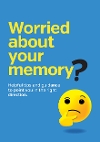Dementia Friendly
As part of our Age Friendly work, Ards and North Down Borough Council has committed to be a welcoming Borough for all. This includes striving to be a Dementia Friendly Council and Borough. Becoming 'Dementia Friendly' is a key commitment of the Council and is incorporated within the Community Plan and Age Friendly Strategy and Action Plan.
There are over 20,000 people living with dementia across Northern Ireland, many of whom live in our Borough, and Age UK's statistics suggest this could rise to 60,000 by 2050.
Worried about your memory?

Dementia Information Booklet (PDF, 716 KB) (opens new window)
Herbert Protocol
The Herbert Protocol was launched by the Police Service of Northern Ireland in partnership with Dementia NI, local Health & Social Care Boards and Policing and Community Safety Partnerships.
It is a simple risk reduction tool consisting of a pre-completed form that contains vital information about a person with Dementia that can be supplied to Police at the earliest opportunity if that person is reported missing.
Information about the person includes; medication, description, photograph, significant places in the person's life and their daily routine, all to be recorded on a form.
Download the Herbert Protocol Form
Read more 1320-22 Herbert Protocol Leaflet A5-digital (psni.police.uk)
Dementia Safeguarding Scheme
Peace of Mind for Caregivers, Safety for this Living with Dementia
We're pleased to introduce our Dementia Safeguarding Scheme. In collaboration with local organisations and statutory partners, we're offering wristbands and hang tags with essential personalised emergency details. These tools are designed to ensure the safety of individuals living with dementia and provide peace of mind for their caregivers.
Join us at our drop-in sessions in May to learn how you can help safeguard vulnerable individuals. Let's make a difference together!
- Monday 19 May | Bangor Carnegie Library | 10am-12noon & 5pm-8pm
- Tuesday 20 May | Newtownards Library | 2pm - 4pm
- Wednesday 21 May | Holywood Library 10am-12 noon | Portaferry Library 2pm-4pm
- Friday 23 May | Donaghadee Library 10am-12 noon | Comber Library 10am-12noon
- Saturday 24 May | Newtownards Library 10am-1pm
How can you help?
Many individuals living with dementia may struggle to communicate when they need help. Our Dementia Safeguarding Scheme provides wristbands and hang tags with vital emergency details. If you come across someone wearing one of these devices, you can quickly access their essential details using NFC technology.
Download this leaflet Dementia Safeguarding Scheme leaflet for general public (PDF, 170 KB) (opens new window) or read the information below to learn more.
How do the Wristbands and Hang Tags work?
To read the tag, you'll need an NFC-enabled smartphone or tablet.
Step-by-Step Instructions:
1. Enable NFC:
- iPhones: NFC is always available.
- Android: You may need to enable NFC in your device settings.
2. Unlock Your Device.
3. Hold Your Device Near the NFC Tag:
- iPhone users: Position the top edge of the phone near the tag (close to the camera).
- Android users: Hold the back middle of the phone near the tag.
4. Wait for the Notification:
- Your device will detect the tag and display a notification or open an app automatically.
5. View the Information:
- Tap the notification to access a phone number of a person who knows the individual and will assist them appropriately.
Helpful Tips:
- Keep your device close, just like holding a magnet near metal.
- Check your phone settings to ensure NFC is enabled.
- Be patient, some devices may take a few seconds to register
- the tag. You may need to try more than once.
- If you can't get the tag to work please phone 101.
By learning how to use this simple technology, you can help safeguard vulnerable individuals and ensure they receive the right support when they need it.




